|
Books Should Be Free Loyal Books Free Public Domain Audiobooks & eBook Downloads |
|
|
Books Should Be Free Loyal Books Free Public Domain Audiobooks & eBook Downloads |
|
Religion |
|---|
|
Book type:
Sort by:
View by:
|
By: Isabella M. Alden | |
|---|---|
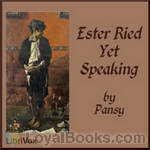 Ester Ried Yet Speaking
Ester Ried Yet Speaking
Authored by Isabella M. Alden under the pen name “Pansy.” Fourth in the Chautauqua Girls series. Alfred Ried (brother of Ester Ried from that series) wants to help the hundreds of poor street boys in his city to come to faith and improve their conditions, but is discouraged and overwhelmed with the task. Enter Flossy (Shipley) Roberts, a willing worker who focuses on 7 such boys and especially on one. | |
By: Israel Zangwill (1864-1926) | |
|---|---|
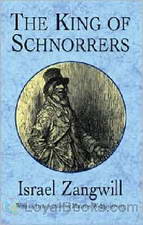 The King of Schnorrers
The King of Schnorrers
Manasseh da Costa is a schnorrer (beggar) who lives on the charitable contributions of the Jews of late 18th-century London. But Manasseh is far from being a humble panhandler for, as every schnorrer knows, supporting the poor is a commandment from God (a mitzvah) not just a favour. And as the descendant of Portuguese Jews who had lived in England for many generations, Manasseh is the social superior of those newly arrived from Eastern Europe (called ‘Tedesco’), even his wealthy patron Joseph Grobstock... | |
 Children of the Ghetto
Children of the Ghetto
In this 1892 novel of London's Jewish East End, Israel Zangwill sets the apparently irrational and decidedly indecorous religious practices of transplanted eastern European Jews against the forces of assimilation. Zangwill's knowledge of Yiddishkeit and skill in melodrama created a series of unforgettable vignettes that had a significant effect on the public perception of this much stigmatized immigrant group. Israel Zangwill (1864-1926) was born in London of Russian and Polish parents. He coined the term cultural "melting pot". | |
By: J Hudson Taylor (1832-1905) | |
|---|---|
 Union and Communion - or Thoughts on the Song of Solomon
Union and Communion - or Thoughts on the Song of Solomon
This little book, whose design is to lead the devout Bible student into the Green Pastures of the Good Shepherd, thence to the Banqueting House of the King, and thence to the service of the Vineyard, is one of the abiding legacies of Mr. Hudson Taylor to the Church. In the power of an evident unction from the Holy One, he has been enabled herein to unfold in simplest language the deep truth of the believer's personal union with the Lord, which under symbol and imagery is the subject of The Song of Songs. (From the Foreword by J Stuart Holden). | |
By: J. A. (Jacob Asbury) Regester (1892-1914) | |
|---|---|
 The Worship of the Church and The Beauty of Holiness
The Worship of the Church and The Beauty of Holiness
| |
By: J. A. MacCulloch (1868-1950) | |
|---|---|
 The Religion of the Ancient Celts
The Religion of the Ancient Celts
| |
By: J. Allanson Picton (1832-1910) | |
|---|---|
 Pantheism, Its Story and Significance Religions Ancient and Modern
Pantheism, Its Story and Significance Religions Ancient and Modern
| |
By: J. C. (Jens Christian) Aaberg (1877-1970) | |
|---|---|
 Hymns and Hymnwriters of Denmark
Hymns and Hymnwriters of Denmark
| |
By: J. C. Ryle (1816-1900) | |
|---|---|
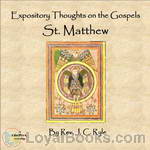 Expository Thoughts on the Gospels - St. Matthew
Expository Thoughts on the Gospels - St. Matthew
“Expository Thoughts” divides the Gospels into sections of about twelve verses each, from which J. C. Ryle selects two or three prominent points to dwell on and bring to the reader’s attention. In Ryle’s day, there were many detailed commentaries and expositions on scripture. In writing these “Expository Thoughts”, Ryle aimed to offer a resource to the laity for use in family prayers, as an aid to those who visit the sick and desire a proper book to read on such occasions, and for private devotions for those whose callings and engagements make it impossible for them to read large commentaries... | |
 Expository Thoughts on the Gospels - St. Mark
Expository Thoughts on the Gospels - St. Mark
“Expository Thoughts” divides the Gospels into sections of about twelve verses each, from which J. C. Ryle selects two or three prominent points to dwell on and bring to the reader’s attention. In Ryle’s day, there were many detailed commentaries and expositions on scripture. In writing these “Expository Thoughts”, Ryle aimed to offer a resource to the laity for use in family prayers, as an aid to those who visit the sick and desire a proper book to read on such occasions, and for private devotions for those whose callings and engagements make it impossible for them to read large commentaries... | |
 Expository Thoughts on the Gospels - St. Luke Vol. 1
Expository Thoughts on the Gospels - St. Luke Vol. 1
“Expository Thoughts” divides the Gospels into sections of about twelve verses each, from which J. C. Ryle selects two or three prominent points to dwell on and bring to the reader’s attention. In Ryle’s day, there were many detailed commentaries and expositions on scripture. In writing these “Expository Thoughts”, Ryle aimed to offer a resource to the laity for use in family prayers, as an aid to those who visit the sick and desire a proper book to read on such occasions, and for private devotions for those whose callings and engagements make it impossible for them to read large commentaries... | |
 New Testament: Being the English Only of the Greek and English Testament
New Testament: Being the English Only of the Greek and English Testament
This New Testament was translated from the Greek by a Christian Universalist evangelist who later fell out of the faith. He was the last person jailed for the charge of blasphemy in the United States, and had many radical views that forced him to question his further involvement in the American Universalist movement. (Introduction by Mark Penfold) | |
 Upper Room: Being a Few Truths for the Times
Upper Room: Being a Few Truths for the Times
Ryle became the first Anglican bishop of Liverpool during a volatile time for the Church of England. Ryle was a strong supporter of the evangelical school and a critic of Ritualism. He was a writer, pastor and an evangelical preacher. Among his longer works are Christian Leaders of the Eighteenth Century (1869), Expository Thoughts on the Gospels (7 vols, 1856–69), Principles for Churchmen (1884). Ryle was described as having a commanding presence and vigorous in advocating his principles albeit with a warm disposition. | |
 Expository Thoughts on the Gospels - St. Luke Vol. 2
Expository Thoughts on the Gospels - St. Luke Vol. 2
“Expository Thoughts” divides the Gospels into sections of about twelve verses each, from which J. C. Ryle selects two or three prominent points to dwell on and bring to the reader’s attention. In Ryle’s day, there were many detailed commentaries and expositions on scripture. In writing these “Expository Thoughts”, Ryle aimed to offer a resource to the laity for use in family prayers, as an aid to those who visit the sick and desire a proper book to read on such occasions, and for private devotions for those whose callings and engagements make it impossible for them to read large commentaries... | |
 Expository Thoughts on the Gospels - St. John Vol. 1
Expository Thoughts on the Gospels - St. John Vol. 1
I send forth the volume now in the reader's hands, with much diffidence, and a very deep sense of responsibility. It is a peculiarly serious undertaking to attempt a Commentary on the Gospel of St. John. This "Commentary" is so extensive that it occupies far more space than the "Expository Thoughts," and is, I must honestly confess, the principal part of the work. To some it may appear far too long and full. But the circumstances of the times are mu justification. We live in a day of abounding vagueness and indistinctness on doctrinal subjects in religion... | |
 Knots Untied
Knots Untied
Being Plain Statements on Disputed Points in Religion, from the Standpoint of an Evangelical Churchman.The volume now in the reader's hands requires a few words of explanation. It contains nineteen papers on subjects which are matters of dispute among English Churchmen in the present day, systematically arranged. A moment's glance at the table of contents will show that there is hardly any point of theological controversy belonging to this era, which is not discussed, with more or less fulness, in these papers... | |
 Two Bears, and Other Sermons for Children
Two Bears, and Other Sermons for Children
”Let no one make you think that you are too young to serve God. That is not true. As soon as you know right from wrong, you are old enough to begin taking the right way. As soon as you are old enough to be punished for doing wrong, you are old enough to give your heart to God, and to follow Christ.” So Rev. Ryle speaks to children of all ages. He does not speak down to children, for even the littlest ones can understand great spiritual truths. Instead, he teaches them in simple language what it means to be a true follower of Jesus and challenges them to live a better life whatever their age by following Jesus’ example – messages we adults could profit from as well... | |
 Hymns and Spiritual Songs
Hymns and Spiritual Songs
In sending forth a new collection of Hymns, I feel it necessary to preface the work by a few words of explanation. The volume now in the reader's hands does not profess to be a complete collection of all the best English hymns. The comfort of invalids and the edification of Christians in private have been the two principal objects I have had in view in preparing this collection. I hold strongly, that holy thoughts often abide for ever in men's memories under the form of poetry, which pass away and are forgotten under the form of prose... | |
 Expository Thoughts on the Gospels - St. John Vol. 2
Expository Thoughts on the Gospels - St. John Vol. 2
The fourteen years which have "passed over" me since I first began writing on the Gospels, I humbly hope have not been thrown away. They have been to me years of many trials, and I may add of much work, much reading, much reflection, and not a little prayer. At the end of these fourteen years, I feel more than ever convinced that what are called "Evangelical" views of Christian truth are thoroughly Scriptural views, and will bear the test of any fair investigation. The longer I live the more firmly I am persuaded that no system of divinity is so entirely in harmony with the Bible, as the system which rightly or wrongly is called "Evangelical... | |
 Practical Religion
Practical Religion
The present volume contains a series of papers about "practical religion," and treats of the daily duties, dangers, experience, and privileges of all who profess and call themselves true Christians. | |
 Old Paths
Old Paths
This book is subtitled “Being Plain Statements on Some of the Weightier Matters of Christianity". The main title comes from the writings the old testament prophet Jeremiah, who refers to the old paths where the good way is, which if people walk in it they will find rest for their souls . Bishop Ryle wrote this book at a time when many in the church were forsaking the old paths of evangelical Christianity in favour of liberal ideas. In Ryle’s day the old doctrines held by the apostolic Christians and reformers had started to be sneered at in certain quarters as being old-fashioned and worn out, and that something more modern was needed... | |
 Expository Thoughts on the Gospels - St. John Vol. 3
Expository Thoughts on the Gospels - St. John Vol. 3
The volume now in the reader's hands completes a work which I began sixteen years ago, entitled "Expository Thoughts on the Gospels." By the good hand of God that work is now finished. For this I desire to be deeply thankful. "Better the end of a thing than the beginning of it." I have now only to commend to my gracious God and Father this feeble attempt to explain a most glorious portion of His revealed Scripture. I do it with humble thankfulness, but with a sense of utter weakness before the power of His word, and of inability to sound the depth even of its simplest sentence... | |
By: J. Dodd (James Dodd) Jackson (1861-1918) | |
|---|---|
 The Message and the Man: Some Essentials of Effective Preaching
The Message and the Man: Some Essentials of Effective Preaching
| |
By: J. E. (John Ebenezer) Esslemont (1874-1925) | |
|---|---|
 Bahá’u’lláh and the New Era
Bahá’u’lláh and the New Era
| |
By: J. E. (Judson Eber) Conant (1867-1955) | |
|---|---|
 The Church, the Schools and Evolution
The Church, the Schools and Evolution
| |
By: J. F. (John Fletcher) Hurst (1834-1903) | |
|---|---|
 History of Rationalism Embracing a Survey of the Present State of Protestant Theology
History of Rationalism Embracing a Survey of the Present State of Protestant Theology
| |
By: J. H. (Joseph Hugh) Beibitz (1868-1936) | |
|---|---|
 Gloria Crucis addresses delivered in Lichfield Cathedral Holy Week and Good Friday, 1907
Gloria Crucis addresses delivered in Lichfield Cathedral Holy Week and Good Friday, 1907
| |
By: J. M. Judy | |
|---|---|
 Questionable Amusements and Worthy Substitutes
Questionable Amusements and Worthy Substitutes
| |
By: J. Manning Potts (1895-1973) | |
|---|---|
 Prayers of the Early Church
Prayers of the Early Church
There are prayers of our Lord, the apostles, the martyrs, and the saints covering the period of the Early Church from its beginning through the fifth century. There are some prayers from each of the first five centuries. The treasure house from which to choose is almost unlimited. It is a vast and fruitful field and anyone is amply rewarded who delves into it.The prayers have been selected primarily for their spiritual and devotional content. Many have been laid aside with regret that they could not be included in this book, but its compass in size is set and only so many can be used... | |
By: J. N. (John Napper) Worsfold | |
|---|---|
 The Vaudois of Piedmont A Visit to their Valleys
The Vaudois of Piedmont A Visit to their Valleys
| |
By: J. Paterson (John Paterson) Smyth (1852-1932) | |
|---|---|
 The Gospel of the Hereafter
The Gospel of the Hereafter
| |
By: J. R. (James Russell) Miller (1840-1912) | |
|---|---|
 Personal Friendships of Jesus
Personal Friendships of Jesus
| |
 Making the Most of Life
Making the Most of Life
| |
By: J. Rendel (James Rendel) Harris (1852-1941) | |
|---|---|
 Memoranda Sacra
Memoranda Sacra
| |
By: J. W. Byers | |
|---|---|
 Sanctification
Sanctification
| |
By: J. W. Keyworth | |
|---|---|
 The Golden Shoemaker or 'Cobbler' Horn
The Golden Shoemaker or 'Cobbler' Horn
| |
By: J. Wilbur (John Wilbur) Chapman (1859-1918) | |
|---|---|
 And Judas Iscariot Together with other evangelistic addresses
And Judas Iscariot Together with other evangelistic addresses
| |
By: Jacob Abbott (1803-1879) | |
|---|---|
 Caleb in the Country
Caleb in the Country
| |
By: Jacob Bryant (1715-1804) | |
|---|---|
 A New System; or, an Analysis of Antient Mythology. Volume I.
A New System; or, an Analysis of Antient Mythology. Volume I.
| |
By: Jakob Andreae | |
|---|---|
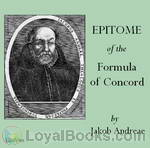 Epitome of the Formula of Concord
Epitome of the Formula of Concord
Formula of Concord (1577) is an authoritative Lutheran statement of faith (called a confession, creed, or "symbol") that, in its two parts (Epitome and Solid Declaration), makes up the final section of the Lutheran Corpus Doctrinae or Body of Doctrine, known as the Book of Concord. The Epitome is a brief and concise presentation of the Formula's twelve articles. | |
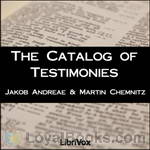 The Catalog of Testimonies
The Catalog of Testimonies
This appendix to the 1580 edition of the Book of Concord is a compilation of Scripture passages together with citations from the fathers of the ancient Christian Church. They are intended to show that the Christology of the Formula of Concord differs neither in substance nor in terminology from Christian Orthodoxy. (Introduction by Jonathan Lange) | |
By: James Allen (1864-1912) | |
|---|---|
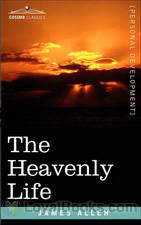 The Heavenly Life
The Heavenly Life
Many of us live with the belief that we can achieve heaven or the ultimate peace and happiness only in an after-life. Many of us believe that heaven is a place that is far removed from earth. However, The Heavenly Life by James Allen seeks to convince us that heaven and hell are both here on earth and they lie within our own selves. A deeply moving, insightful and philosophical book that explores the ideas of living with integrity, in harmony with our fellows and in finding the power of love and integrity, The Heavenly Life was first published in 1903... | |
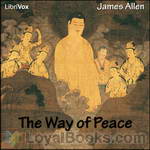 The Way of Peace
The Way of Peace
The Way of Peace is your guide to the power of meditation; self and truth; the acquirement of spiritual power; the realization of selfless love; entering into the infinite; saints, sages, and saviors; the law of service; and the realization of perfect peace. | |
 Man: King of Mind, Body, and Circumstance
Man: King of Mind, Body, and Circumstance
The problem of life consists in learning how to live. It is like the problem of addition or subtraction to the schoolboy. When mastered, all difficulty disappears, and the problem has vanished. All the problems of life, whether they be social, political, or religious, subsist in ignorance and wrong-living. As they are solved in the heart of each individual, they will be solved in the mass of men. Humanity at present is in the painful stage of “learning.” It is confronted with the difficulties of its own ignorance... | |
 Way of Peace (version 2)
Way of Peace (version 2)
James Allen (1864 - 1912) was a philosopher and a pioneer of New Thought movement. His works have formed the basis of much of the curriculum used today by many motivational and self-help groups. His first book, which published in 1901, was From Poverty to Power, subtitled The Realization of Prosperity and Peace. Allen described this book as "A Book for all those who are in search of better conditions, wider freedom, and increased usefulness." Orinigally ,the book consisted of two separate volumes, The Path To Prosperity (sometimes rendered as The Path of Prosperity) and The Way of Peace. Each volume was later published separately. This recording is of the second volume. | |
 Morning and Evening Thoughts
Morning and Evening Thoughts
James Allen was a British philosophical writer known for his inspirational books and poetry and as a pioneer of the self-help movement. Allen wrote about complex subjects such as faith, destiny, love, patience, and religion but had the unique ability of explaining these subjects clearly and in a way that is easy to understand.His best known work, As a Man Thinketh, has been mass-produced since its publication in 1903. Morning and Evening Thoughts was published in 1909 and it provides a thought for each morning and evening of the day for a month. This book, compiled by his wife, Lily Allen, draws on quotes and sayings from Allen’s other works. | |
By: James Barr Walker (1805-1887) | |
|---|---|
 Philosophy of the Plan of Salvation
Philosophy of the Plan of Salvation
The book is a series of independent demonstrations, the results of which accumulate to the final conclusion, that the Christian religion is necessarily the only religion possible to meet the spiritual wants of mankind. In arriving at this conclusion, the different arts and processes of revealed religion are examined, and their adaptedness to perform their several functions in elevating, purifying, and actuating the human soul to benevolent effort, is determined, and, finally, the practical operation of the system is shown, as a matter of undeniable experience, to produce the complete and necessary result required... | |
By: James Buchanan (1804-1870) | |
|---|---|
 Modern Atheism under its forms of Pantheism, Materialism, Secularism, Development, and Natural Laws
Modern Atheism under its forms of Pantheism, Materialism, Secularism, Development, and Natural Laws
| |
By: James Cardinal Gibbons (1834-1921) | |
|---|---|
 The Faith of Our Fathers
The Faith of Our Fathers
The Faith of Our Fathers: A Plain Exposition and Vindication of the Church Founded by Our Lord Jesus Christ is a book published in 1876 by archbishop James Gibbons, which became a best-selling conversion manual in the United States, and by 1980 was in its 111th printing.(From the preface) “The object of this little volume is to present in a plain and practical form an exposition and vindication of the principal tenets of the Catholic Church. It was thought sufficient to devote but a brief space to such Catholic doctrines and practices as are happily admitted by Protestants, while those that are controverted by them are more elaborately elucidated... | |
By: James Challis (1803-1882) | |
|---|---|
 An Essay on the Scriptural Doctrine of Immortality
An Essay on the Scriptural Doctrine of Immortality
| |
By: James Denney (1856-1917) | |
|---|---|
 The Atonement and the Modern Mind
The Atonement and the Modern Mind
| |
By: James Donaldson (1831-1915) | |
|---|---|
 Ante-Nicene Christian Library: Translations of the Writings of the Fathers Down to A.D. 325, Volume 2
Ante-Nicene Christian Library: Translations of the Writings of the Fathers Down to A.D. 325, Volume 2
This collection is the second volume in a series of New Testament Apocrypha. - Summary by KevinS | |
By: James E. Talmage | |
|---|---|
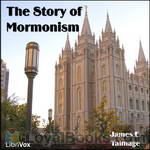 The Story of Mormonism
The Story of Mormonism
A few years before James E. Talmage was called to serve as an apostle for the Church of Jesus Christ of Latter-day Saints (also known as the "Mormon" church), he gave a series of lectures at universities such as the University of Michigan and Cornell, describing the history of the Church. These lectures were later compiled and published as 'The Story of "Mormonism."' It is a concise, yet informative summary for all interested in learning the history and beliefs of the "Mormon" church. (Summary by Nathan Markham) | |
 The Great Apostasy: Considered in the Light of Scriptural and Secular History
The Great Apostasy: Considered in the Light of Scriptural and Secular History
Elder James E. Talmage, an apostle of The Church of Jesus Christ of Latter-day Saints, makes a survey of the Latter-day Saint view of the Great Apostasy. The book's subtitle states that it is a study "considered in the in the light of scriptural and secular history," and includes a discussion of the establishment of Christ's church in the meridian of time, the predictions and causes of its apostasy, or falling away, and the restoration of Christ's church in the Latter-days by a modern prophet. | |
By: James Edward Talmage (1862-1933) | |
|---|---|
 Jesus the Christ A Study of the Messiah and His Mission According to Holy Scriptures Both Ancient and Modern
Jesus the Christ A Study of the Messiah and His Mission According to Holy Scriptures Both Ancient and Modern
| |
By: James Fenimore Cooper (1789-1851) | |
|---|---|
 Heidenmauer; or, The Benedictines. A Legend of the Rhine
Heidenmauer; or, The Benedictines. A Legend of the Rhine
This is a story that is set in 16th century Germany. Characters representing the various classes of the remnants of feudalism and the rising bourgeois class struggle against each other. Placed in the light of the very recent and polarizing Protestant Reformation, the characters' tensions increase. - Summary by Joel Kindrick | |
By: James Frazer (1854-1941) | |
|---|---|
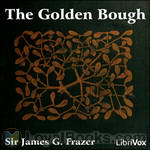 The Golden Bough
The Golden Bough
The Golden Bough: A Study in Magic and Religion is a wide-ranging comparative study of mythology and religion, written by Scottish anthropologist Sir James George Frazer (1854–1941). It offered a modernist approach, discussing religion dispassionately as a cultural phenomenon, rather than from a theological perspective. Although most of its theories have subsequently been exploded (the most famous one being that of the relationship between magic, religion and science), its impact on contemporaneous European literature was substantial... | |
By: James Freeman Clarke (1810-1888) | |
|---|---|
 Orthodoxy: Its Truths And Errors
Orthodoxy: Its Truths And Errors
| |
 Three Essays by James Freeman Clarke
Three Essays by James Freeman Clarke
Three diverse essays on souls in animals, a comparison of Buddhism and Christianity, and individualism in religion. Born in Hanover, New Hampshire, James Freeman Clarke attended the Boston Latin School, graduated from Harvard College in 1829, and Harvard Divinity School in 1833. Ordained into the Unitarian church he… soon threw himself into the national movement for the abolition of slavery. In 1839 he returned to Boston where he and his friends established (1841) the Church of the Disciples which brought together a body of people to apply the Christian religion to social problems of the day…... | |
By: James H. (James Henry) Snowden (1852-1936) | |
|---|---|
 A Wonderful Night; An Interpretation Of Christmas
A Wonderful Night; An Interpretation Of Christmas
| |
By: James H. Moon (1830-) | |
|---|---|
 Water Baptism A Pagan and Jewish Rite but not Christian, Proven By Scripture And History Confirmed By The Lives Of Saints Who Were Never Baptized With Water
Water Baptism A Pagan and Jewish Rite but not Christian, Proven By Scripture And History Confirmed By The Lives Of Saints Who Were Never Baptized With Water
| |
By: James Hamilton (1814-1867) | |
|---|---|
 Life of Bunyan [Works of the English Puritan divines]
Life of Bunyan [Works of the English Puritan divines]
| |
By: James Hinton (1822-1875) | |
|---|---|
 Mystery of Pain
Mystery of Pain
This book is addressed to the sorrowful, ... to whom their own or others' pain is a daily burden, upon whose hearts it weighs with an intolerable anguish. I seek to speak to these ; not as a teacher, but as a fellow. Sharing their feeling, and knowing well how vain is the attempt to throw off misery, or to persuade ourselves that life is better than it is, I would fain share with them also some thoughts that have seemed to me capable of casting a bright gleam of light athwart the darkness, and, if they are true, of bringing an immense, an incredible joy out of the very bosom of distress. - Summary by James Hinton | |
By: James Hudson Taylor (1832-1905) | |
|---|---|
 A Ribband of Blue And Other Bible Studies
A Ribband of Blue And Other Bible Studies
| |
 Separation and Service or Thoughts on Numbers VI, VII.
Separation and Service or Thoughts on Numbers VI, VII.
| |
By: James Janeway (1636?-1674) | |
|---|---|
 Stories of Boys and Girls Who Loved the Saviour A Token for Children
Stories of Boys and Girls Who Loved the Saviour A Token for Children
| |
By: James Kennedy (1815-1899) | |
|---|---|
 Life and Work in Benares and Kumaon, 1839-1877
Life and Work in Benares and Kumaon, 1839-1877
| |
By: James Kerr (1847-1905) | |
|---|---|
 The Covenants And The Covenanters Covenants, Sermons, and Documents of the Covenanted Reformation
The Covenants And The Covenanters Covenants, Sermons, and Documents of the Covenanted Reformation
| |
By: James M. Oxley (1855-1907) | |
|---|---|
 Bert Lloyd's Boyhood A Story from Nova Scotia
Bert Lloyd's Boyhood A Story from Nova Scotia
| |
By: James Morris Whiton (1833-1920) | |
|---|---|
 Miracles and Supernatural Religion
Miracles and Supernatural Religion
| |
By: James Patrick | |
|---|---|
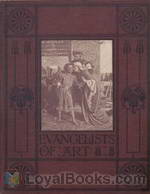 Evangelists of Art Picture-Sermons for Children
Evangelists of Art Picture-Sermons for Children
| |
By: James Stalker (1848-1927) | |
|---|---|
 The Life of St. Paul
The Life of St. Paul
| |
 The Trial and Death of Jesus Christ A Devotional History of our Lord's Passion
The Trial and Death of Jesus Christ A Devotional History of our Lord's Passion
| |
 The Preacher and His Models The Yale Lectures on Preaching 1891
The Preacher and His Models The Yale Lectures on Preaching 1891
| |
By: James [Editor] O'Leary | |
|---|---|
 The Most Ancient Lives of Saint Patrick Including the Life by Jocelin, Hitherto Unpublished in America, and His Extant Writings
The Most Ancient Lives of Saint Patrick Including the Life by Jocelin, Hitherto Unpublished in America, and His Extant Writings
| |
By: Jane M. (Jane Marie) Bancroft (1847-1932) | |
|---|---|
 Deaconesses in Europe and their Lessons for America
Deaconesses in Europe and their Lessons for America
| |
By: Jean Finot (1858-1922) | |
|---|---|
 Modern Saints and Seers
Modern Saints and Seers
| |
By: Jean Guibert (1857-1914) | |
|---|---|
 On the Exercises of Piety
On the Exercises of Piety
In this book, Father Jean Guibert of the Society of St. Sulpice shows how piety permeates the spiritual life in mental and vocal prayer, in the sacraments, in various devotions, in spiritual reading, in the examination of one's conscience, and in spiritual retreats. This book is the sequel to Father Guibert's On Piety, wherein he explains the nature of piety and its effects. Both books bear an imprimatur. | |
 On Piety
On Piety
Father Jean Guibert of the Society of St. Sulpice served as superior of the Catholic Institute of Paris. He wrote this short book, which bears an imprimatur, for both those who practice piety and those who disdain it. As noted in the preface to this book, the practice of piety has many advantages. The pious person is drawn into closer contact with God, his heart is purified and made glad, his mind is enlightened, his will is strengthened, and his zeal to love God and neighbor is enkindled. In Part I (Chapters 1-11), Father Guibert discusses the nature of piety, and in Part II (Chapters 12-18), he enumerates its fruits... | |
By: Jean Toomer (1894-1967) | |
|---|---|
 An Interpretation of Friends Worship
An Interpretation of Friends Worship
| |
By: Jean-Henri Merle d'Aubigné (1794-1872) | |
|---|---|
 History of the Reformation in the Sixteenth Century, Volume 1
History of the Reformation in the Sixteenth Century, Volume 1
The History of the Reformation in the Sixteenth Century, by Jean-Henri Merle d’Aubigné, is a classic work on the great events that re-opened the Christian gospel to a needy world. It tells of how the twenty-year-old Martin Luther, browsing through books in the library at the University of Erfurt, takes down from the shelf a particular volume that has caught his interest. He has never seen anything like it. It is a Bible! He is astonished to find in this volume so much more than the fragments of gospels and epistles that were selected for public reading in churches... | |
 History of the Reformation in the Sixteenth Century, Volume 2
History of the Reformation in the Sixteenth Century, Volume 2
The History of the Reformation in the Sixteenth Century, by Jean-Henri Merle d’Aubigné, is a classic work on the great events that re-opened the Christian gospel to a needy world. The author was a Swiss Protestant pastor. He was also a historian with a great understanding of the Bible, along with a broad and deep knowledge of the Reformation.D’Aubigné tells the story of outstanding people who had a love for God and his word, and who dared to present biblical truths which had been obscured for centuries... | |
By: Jeanne Marie Bouvier de la Motte Guyon | |
|---|---|
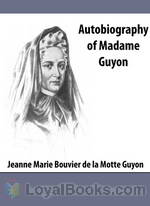 Autobiography of Madame Guyon
Autobiography of Madame Guyon
Jeanne-Marie Bouvier de la Motte-Guyon (commonly known as Madame Guyon) (April 13, 1648 – June 9, 1717) was a French mystic and one of the key advocates of Quietism. Quietism was considered heretical by the Roman Catholic Church, and she was imprisoned from 1695 to 1703 after publishing a book on the topic, A Short and Easy Method of Prayer. This translation is by Thomas Taylor Allen was first published in 1897. Allen’s dates are unknown. | |
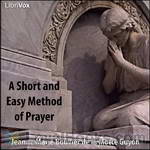 A Short and Easy Method of Prayer
A Short and Easy Method of Prayer
Originally published in 1685, Madame Guyon’s A Short and Easy Method of Prayer is considered a classic of Christian mysticism, influencing great writers and speakers such as John Wesley and Charles Spurgeon. In it, Madame Guyon carefully and briefly sets out her ‘unmethodical method’ by which any and all can commune with God at any time and under any circumstances. | |
 Spiritual Torrents
Spiritual Torrents
| |
 Letters of Madam Guyon
Letters of Madam Guyon
| |
By: Jeremiah Burroughs (1599-1646) | |
|---|---|
 Treatise of Earthly-mindedness
Treatise of Earthly-mindedness
Of Earthly-mindedness, Wherein is shewed, 1. What Earthly-mindedness is. 2. The Evils of Earthly-mindedness. 3. Several Convincements of Earthly-mindedness. 4. Several Reasons of Earthly-mindedness. 5. Considerations to take off the heart from Earthly-mindedness. 6. Directions how to get our hearts free from Earthly-mindedness. | |
By: Jeremiah Chaplin (1813-1886) | |
|---|---|
 The Riches of Bunyan Selected from His Works
The Riches of Bunyan Selected from His Works
| |
By: Jeremy Taylor (1613-1667) | |
|---|---|
 Rule and Exercises of Holy Dying
Rule and Exercises of Holy Dying
Written by a Church of England clergyman in the time of Cromwell, this work is praised for both its style and content. Taylor's work was much admired by John Wesley, the founder of Methodism, for its devotional quality; and by Samuel Taylor Coleridge, Thomas de Quincey, and Edmund Gosse for its literary qualities.Holy Dying is meant to instruct the reader in the "means and instruments" of preparing for a blessed death, written in a time when death was a constant companion to life and not to be encountered without being ready for it. It assumes illness and a death-bed, with recommended meditations and prayers for the sick, the family, and the clergyman attending to the dying one. | |
By: Jerry McAuley (1839-1884) | |
|---|---|
 Transformed; or, the History of a River Thief, Briefly Told
Transformed; or, the History of a River Thief, Briefly Told
Jerry McAuley gives a testimony of his transformation from one of the wickedest men to ever live to being saved and a life of helping others do the same. | |
By: Jesse Benedict Carter (1872-1917) | |
|---|---|
 The Religion of Numa And Other Essays on the Religion of Ancient Rome
The Religion of Numa And Other Essays on the Religion of Ancient Rome
| |
By: Jesse Lyman Hurlbut (1843-1930) | |
|---|---|
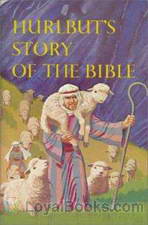 Hurlbut's Story of the Bible
Hurlbut's Story of the Bible
As a parent, many of us would like our children to be familiar with our sacred books, no matter to which religion or faith we belong. However, very young children may find the language and the ideas quite difficult to assimilate. Yet the stories are so memorable and valuable that we want our children to know them as early as possible. Published in 1905, Hurlbut's Story of The Bible – 1 is a wonderful compilation of some of the most important and delightful stories to be found in both the Old and New Testaments... | |
 Hurlbut's Life of Christ For Young and Old
Hurlbut's Life of Christ For Young and Old
Hurlbut's Life of Christ For Young and Old is a detailed, chronological presentation of the life of Christ, relying heavily on quoted portions of Scripture/ Rev. Hurlbut makes the gospel story accessible for the reader as each episode and teaching is presented as natural dialog. The Life of Christ is a worthy companion to his larger multi-volume Story of the Bible. These are true classics of Christian literature. - Summary by Larry Wilson | |
By: Jessie E. Sampter (1883-1938) | |
|---|---|
 Blessings for Chanukah
Blessings for Chanukah
volunteers bring you 12 recordings of Blessings for Chanukah by Jessie E. Sampter. This was the Weekly Poetry project for December 9, 2018. ------ Jessie Sampter was a Jewish educator, poet, and Zionist pioneer. She was born in New York City and immigrated to Palestine in 1919. In her twenties, she joined the Unitarian Church and began writing poetry. Her poems and short stories emphasized her primary concerns: pacifism, Zionism, and social justice. - Summary by Wikipedia | |
By: Jewish Publication Society of America | |
|---|---|
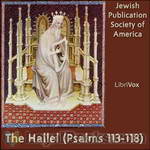 The Hallel (Psalms 113-118)
The Hallel (Psalms 113-118)
Hallel (Hebrew: הלל “Praise [God]“) is part of Judaism’s prayers, a verbatim recitation from Psalms 113-118, which is used for praise and thanksgiving that is recited by observant Jews on Jewish holidays. Summary from WikipediaRead by Délibáb, D.E. Wittkower, Jc Guan, Katie Gibboney, Leon Mire, and Scott Sherris | |
 Genesis (JPSA)
Genesis (JPSA)
The first book of the Pentateuch - Genesis. Presented according to weekly parshah.Praised are You, Adonai, Our G-d, ruler of the Universe, who has made us holy with commandments and commanded us to engage in the study of Torah. | |
 Exodus (JPSA)
Exodus (JPSA)
The second book of the Pentateuch - Exodus. Presented according to weekly parshah.Praised are You, Adonai, Our G-d, ruler of the Universe, who has made us holy with commandments and commanded us to engage in the study of Torah. (Introduction by Linette Geisel & traditional prayer. Parshat descriptions provided by Wikipedia) | |
 Torah (JPSA) 03: Leviticus
Torah (JPSA) 03: Leviticus
The third book of the Pentateuch - Leviticus. Presented according to weekly parshah. Praised are You, Adonai, Our G-d, ruler of the Universe, who has made us holy with commandments and commanded us to engage in the study of Torah. . - Summary by Linette Geisel. Parshat descriptions provided by Wikipedia | |